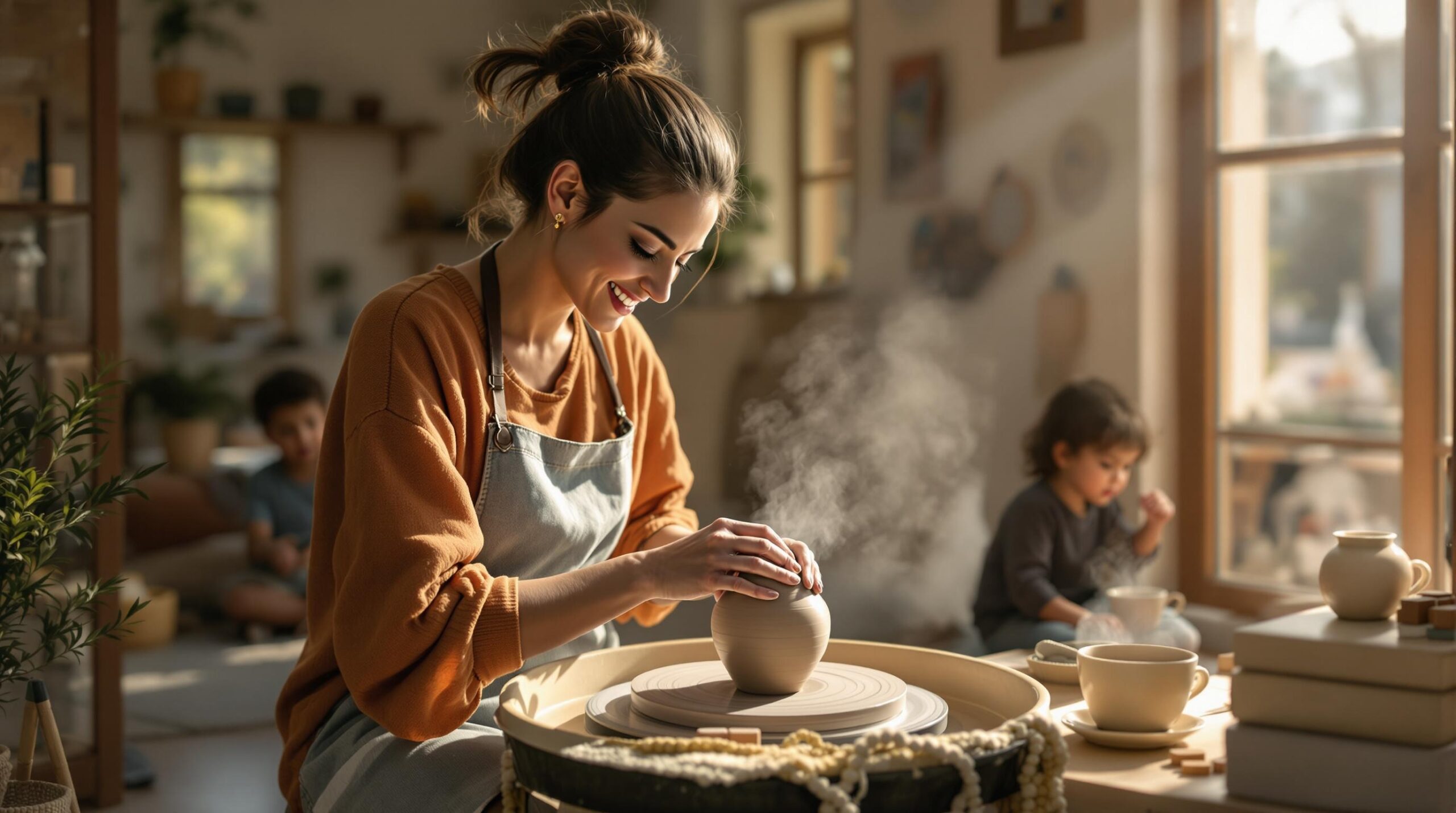Table of Contents
ToggleParenting is a rewarding journey filled with moments of joy, challenges, and personal growth. However, amid the responsibility of raising children, many parents forget to nurture their own interests. The relentless cycle of diaper changes, homework supervision, and extracurricular activities can leave little room for personal hobbies. But should parents put their own interests on hold indefinitely? Absolutely not.
Hobbies aren’t frivolous indulgences but rather vital components of a balanced life. They offer parents a chance to reconnect with themselves, reduce stress, and maintain their identity beyond their parenting role. In this article, I’ll explore why hobbies matter for parents and provide practical guidance for finding and maintaining interests that complement your busy family life.

The Mental Health Benefits of Hobbies for Parents
The soothing effect of engaging in a beloved hobby isn’t just anecdotal—it’s backed by science. According to research from the National Institute of Mental Health (NIMH), regular participation in leisure activities significantly lowers cortisol levels, our body’s primary stress hormone. This biochemical reduction translates into tangible mood improvements and greater emotional resilience.
When I speak with parents about essential self-care practices, hobbies frequently top the list of effective stress-management techniques. Think about the last time you were completely absorbed in an activity you loved—perhaps painting, gardening, or playing music. That state of focused attention, sometimes called “flow,” acts as a mental vacation from parenting pressures.
For parents experiencing heightened stress, hobbies offer a protective buffer. They provide a healthy outlet for emotions and create psychological distance from sources of anxiety. This mental space is particularly valuable on days when parenting feels overwhelming.
The NIMH study highlighted that even short periods of hobby engagement—as little as 20 minutes—can trigger the release of endorphins, our body’s natural mood elevators. For parents battling postpartum depression or general parenting fatigue, consistent hobby participation can complement other treatment approaches by providing regular mood boosts.
Creating Mental Space Through Hobbies
Hobbies carve out crucial mental space in a parent’s crowded mind. They interrupt rumination—that endless loop of worrying thoughts about children’s development, educational choices, or future challenges. By giving your brain something specific and enjoyable to focus on, hobbies halt this draining thought pattern.
For instance, a parent who regularly engages in woodworking might find that measuring, cutting, and assembling pieces demands such precise attention that worries about tomorrow’s parent-teacher conference temporarily fade. This mental break, though brief, allows the nervous system to recalibrate and promotes clearer thinking when returning to parental responsibilities.
Cognitive Advantages and Creativity Boost
Beyond stress reduction, hobbies sharpen our cognitive abilities. The National Center for Education Statistics (NCES) reports that adults who participate in leisure learning activities demonstrate better problem-solving skills and mental flexibility compared to those who don’t.
For parents, these cognitive benefits extend into their parenting approach. A mom who tackles complex knitting patterns or a dad who masters chess strategies develops patience and analytical thinking that transfers to addressing children’s behavioral puzzles or educational challenges.
Certain hobbies directly enhance creativity by encouraging experimental thinking. Photography teaches composition and perspective; cooking develops improvisational skills; writing cultivates expressive communication. These creative abilities enrich family life as parents apply their expanded perspective to everything from resolving sibling disputes to crafting memorable family traditions.
Brain Health and Lifelong Learning
Hobbies that involve learning new skills—like mastering a language, playing an instrument, or developing coding abilities—forge novel neural pathways in the brain. This neurological development doesn’t just benefit personal cognition; it models lifelong learning for children.
Research demonstrates that parents who actively pursue knowledge in areas of interest raise children who view learning as a continuous, joyful process rather than merely academic requirement. A father enthusiastically learning guitar chords communicates more about the value of perseverance than countless lectures on the subject.
Additionally, hobbies that challenge different aspects of cognition—spatial reasoning in pottery, mathematical thinking in music, verbal fluency in creative writing—help maintain cognitive versatility. This diverse mental exercise keeps parents intellectually nimble, better equipped to handle the varied demands of child-rearing.
Building Social Connections Through Hobbies
The isolation that sometimes accompanies parenthood can feel insurmountable, particularly during early childhood years when demands for care are constant. Hobbies offer a natural bridge to adult connections beyond discussions of diaper brands or school districts.
The U.S. Department of Health and Human Services (HHS) emphasizes social connections as a fundamental component of adult wellbeing. Hobby-based social groups create relationships centered on shared interests rather than exclusively on parenting, allowing for multidimensional connections.
Joining a local running club, attending pottery classes, or participating in a book discussion group introduces parents to individuals from various life stages and backgrounds. These connections expand perspective and provide adult conversation that doesn’t revolve around children—something many parents crave during intensive parenting periods.
Fostering Community Through Shared Interests
Hobby groups often develop into supportive communities that extend beyond the activity itself. A parent who joins a weekend hiking group might find fellow adventurers willing to exchange childcare, share parenting insights, or offer professional networking opportunities.
Online communities built around specific interests have similar benefits while accommodating the scheduling constraints many parents face. A late-night crafting forum can provide camaraderie for the mom who only finds creative time after children are asleep.
Parents who struggle with burnout often report that hobby-based social connections provide uniquely restorative interactions. Unlike work relationships or sometimes competitive parenting circles, hobby groups typically focus on mutual enjoyment rather than achievement, creating low-pressure social environments.
Setting a Positive Example: Role Modeling for Children
Children absorb more from watching their parents than from listening to them. The National Institute of Child Health and Human Development (NICHD) research confirms that parental behaviors profoundly influence children’s development of interests, persistence, and self-directed learning.
When parents visibly engage with hobbies, they demonstrate crucial life skills: dedication to personal growth, healthy stress management, and the joy of mastering challenges. A mother who carves out time for running despite a packed schedule teaches her children about prioritizing health. A father who practices guitar after dinner shows the value of consistent effort.
Children who observe parents pursuing interests develop an expanded vision of adulthood beyond work and family obligations. They internalize the message that personal passions remain important throughout life’s stages.
Inspiring Children’s Exploration
Parental hobbies frequently spark children’s curiosity. The dad who tinkers with electronics might find his daughter requesting her own simple circuit kit. The mom who gardens often has children eager to plant their own seeds. These shared interests create natural opportunities for knowledge transfer and quality time.
By modeling enthusiasm for learning in areas of personal interest, parents cultivate children’s intrinsic motivation. Kids learn that pursuing knowledge isn’t simply about external rewards but about the satisfaction of curiosity and the joy of competence.
Even when children don’t share parents’ specific interests, they benefit from observing the dedication process. Watching a parent struggle, persist, and eventually succeed in a challenging hobby teaches resilience more effectively than any lecture on grit.
Finding the Perfect Hobby: Tips for Parents
Identifying fulfilling hobbies requires thoughtful consideration of personal interests, practical constraints, and potential benefits. The U.S. Department of Education recommends starting this exploration by reflecting on childhood interests that may have been abandoned during the transition to adulthood and parenthood.
Consider activities that once brought joy but were set aside due to life’s demands. Did you enjoy sketching, playing an instrument, or building models? These early interests often retain their appeal and provide an accessible re-entry point into hobby engagement.
Alternatively, consider current interests that could evolve into hobbies. Does scrolling through food photography inspire you? Perhaps cooking classes would provide satisfaction. Are you drawn to nature documentaries? Hiking or bird watching might transform passive appreciation into active engagement.
Practical Evaluation for Hobby Selection
Before committing to a hobby, assess its compatibility with your family circumstances:
Time availability: Realistically evaluate your schedule. Some hobbies (like reading or podcasting) can fit into small time pockets, while others (like woodworking or tennis) require larger time blocks. Choose activities that match your actual availability rather than your ideal schedule.
Financial investment: Consider initial and ongoing costs. Many hobbies have low-cost entry points—borrowing books from libraries, using free exercise videos, or utilizing community garden plots. Others require significant investment in equipment or membership fees.
Space requirements: Assess your home environment. Apartment dwellers might prefer hobbies with minimal storage needs, while those with garage space might explore woodworking or larger craft projects.
Family integration potential: Some hobbies can incorporate children (cooking, gardening, certain sports), while others provide necessary solo time. Both types have value, but understanding which you need most will guide your selection.
Starting Small and Building Gradually
Avoid the perfectionist trap of believing a hobby requires immediate mastery or substantial time commitment. Beginning with 15-minute daily practice or a weekly hour-long session creates sustainability. As interest deepens and skills develop, you’ll naturally find additional time for your hobby.
Consider trial periods for potential hobbies before investing heavily. Many studios offer introductory classes, libraries loan specialty equipment, and online tutorials provide no-cost exploration of numerous activities. This experimental approach prevents the accumulation of abandoned hobby supplies and helps identify truly resonant pursuits.
Balancing Hobbies and Parenting: Time Management Strategies
Finding time for hobbies amid parenting responsibilities requires intentional planning and creative scheduling. The American Psychological Association (APA) suggests that structured leisure time produces greater satisfaction than randomly occurring free moments.
Consider establishing a hobby schedule that family members respect—perhaps Sunday afternoons for photography or Tuesday evenings for online language classes. Communicate this time commitment to your partner and children (age-appropriately), helping them understand that your personal interests make you a more patient, engaged parent.
For parents of young children, finding personal time without guilt may require creative approaches. Nap time hobbies, early morning routines before children wake, or activity swaps with fellow parents can create dedicated hobby periods without sacrificing quality family time.
Integrating Hobbies into Family Life
Some hobbies blend naturally with family activities. A parent who enjoys photography can practice their craft during family outings. A cooking enthusiast might involve children in age-appropriate kitchen tasks. A gardener can designate a portion of the plot for children’s planting experiments.
This integration serves multiple purposes: maintaining hobby engagement during intensive parenting periods, sharing personal passions with children, and creating distinctive family experiences centered around parental interests.
For hobbies requiring focused concentration, consider “parallel play” arrangements where children engage in their activities alongside your hobby practice. A child coloring while you sketch, or building with blocks while you knit, creates connection without interrupting either person’s focus.
Physical and Mental Health Improvements
The Centers for Disease Control and Prevention (CDC) reports compelling connections between regular leisure activities and improved health outcomes. Various hobbies offer specific physical benefits that complement mental health advantages.
Physical hobbies like dancing, hiking, swimming, or cycling obviously improve cardiovascular health, strength, and flexibility. Less apparent is how craft hobbies enhance fine motor control, gardening builds functional strength, and musical instruments improve coordination.
Parents often sacrifice physical activity amid competing priorities, but hobby-based movement feels less like obligatory exercise and more like enjoyable engagement. The parent who abandons dreaded gym sessions but enthusiastically attends dance classes achieves better fitness through consistency.
Mental Health Enhancement Through Hobbies
Beyond the general stress reduction mentioned earlier, certain hobbies specifically target mental health improvements. Meditation, yoga, and tai chi directly address anxiety by teaching breath control and present-moment awareness. Creative pursuits like art and music provide emotional expression outlets, particularly valuable for processing complex parental emotions.
Parents managing specific mental health conditions may find tailored benefits in various hobbies. Those with depression often report improvement with physically active interests that increase endorphin production. Parents experiencing anxiety frequently benefit from precision hobbies like baking or model building that require focused attention, interrupting rumination cycles.
The best self-care approaches for parents often combine different types of hobby engagement to address various aspects of well-being, creating a comprehensive support system for parental health.
Budget-Friendly Hobby Options for Parents
Financial constraints needn’t prevent hobby participation. The U.S. Department of Agriculture (USDA) highlights numerous no-cost or low-cost recreational options available through public lands, community programs, and digital resources.
Nature-based hobbies like hiking, bird watching, stargazing, or foraging require minimal investment beyond basic outdoor gear. Public libraries offer free access to books, digital media, and often unexpected resources like musical instruments, art supplies, or specialty baking equipment available for checkout.
Community resources frequently provide affordable hobby access. Parks and recreation departments offer reduced-cost classes; community colleges provide non-credit courses at fraction of four-year institution prices; religious organizations and community centers host various interest groups with nominal fees.
Digital Resources for Affordable Hobby Exploration
The digital landscape offers extensive free or low-cost hobby instruction. Video tutorials, podcasts, and specialty forums provide guidance for countless interests without requiring expensive classes. Parents with unpredictable schedules particularly benefit from these on-demand learning options.
For hobbies requiring supplies, consider creative acquisition strategies: thrift stores for craft materials, equipment rental for occasional use, supply swaps with fellow enthusiasts, or multi-family purchases of expensive items like specialty kitchen appliances or tools.
Remember that many hobbies become more economical over time as initial investments in basic equipment spread across years of use. A sewing machine’s cost, divided by hundreds of projects, represents minimal per-use expense.
Utilizing Community Resources for Hobbies
Local communities offer rich resources for hobby exploration and development. The National Endowment for the Arts (NEA) supports numerous community arts programs that provide affordable instruction in visual arts, music, theater, and literature.
Begin exploring at your local library, which often serves as an information hub for community activities. Beyond lending materials, many libraries host interest groups, workshops, and classes ranging from technology skills to creative writing. Librarians can direct you to specialized resources for particular hobbies.
Community centers frequently offer spaces for hobby groups to gather and share expertise. From quilting circles to chess clubs, these ready-made communities welcome newcomers and provide structured hobby engagement without requiring solo initiative.
Finding Your Hobby Community
Connecting with fellow enthusiasts enhances hobby satisfaction and provides accountability for continued participation. Search online platforms like Meetup for local interest groups, or check bulletin boards at specialty stores related to your hobby.
Don’t overlook virtual communities when local options are limited. Online forums, social media groups, and video meetups connect hobbyists across geographic boundaries. These digital communities prove especially valuable for parents with mobility limitations or irregular schedules.
Educational institutions—from continuing education programs to specialized schools—offer structured learning for various hobbies. Many accommodate busy parents through evening classes, weekend workshops, or asynchronous online instruction.
Overcoming Common Barriers to Starting a Hobby
Despite good intentions, many parents encounter obstacles when attempting to establish hobby practices. The Substance Abuse and Mental Health Services Administration (SAMHSA) identifies several common barriers to self-care activities, including time constraints, perfectionism, guilt, and lack of support.
Time limitations represent the most frequently cited obstacle. To overcome this barrier, reject the notion that hobbies require large time blocks. Instead, identify “hobby snippets”—10-15 minute periods throughout your day when brief engagement is possible. Reading a few pages, practicing five minutes of instrument scales, or sketching a quick study can maintain skill development and interest during especially busy periods.
Perfectionist tendencies prevent many parents from beginning hobbies because they fear producing amateur results. Remember that expertise develops through practice, and the journey itself provides primary benefits. Focus on process enjoyment rather than outcome excellence, especially when starting.
Managing Guilt and Building Support
Parental guilt often undermines hobby commitment. Some parents feel selfish allocating time to personal interests rather than family activities. Challenge this thinking by recognizing that hobby participation makes you a better parent through improved mood, decreased stress, and modeling healthy adult behavior.
Lack of family support can derail hobby practices. Address this by clearly communicating hobby benefits, involving family appropriately, and negotiating equitable leisure time distribution. Partners who alternate personal time ensure both adults maintain individual interests while managing family responsibilities.
For parents facing unique challenges like chronic illness or digital distractions, adapting hobby approaches becomes essential. Consider seated versions of active hobbies, audio instruction during commutes, or structured technology breaks to create space for offline interests.
Long-Term Benefits of Maintaining Hobbies
Sustained hobby engagement yields compounding benefits across decades. The National Institute on Aging (NIA) research indicates that adults who maintain leisure interests throughout life experience better cognitive function, greater social connection, and higher reported life satisfaction in their later years.
Hobbies that evolve with life stages provide continuity through parenting transitions. The running enthusiast who shifts from marathon training to family hikes during early parenting years, then returns to solo trail running as children gain independence, maintains their fundamental interest while adapting its expression.
Parents who preserve personal interests while raising children report smoother transitions during major family changes—children starting school, entering adolescence, leaving home. These parents maintain core identity aspects separate from their parenting role, reducing disruption during parenting role shifts.
Creating Family Legacies Through Hobbies
Long-term hobbies often become family legacies as children absorb parental passions. The dad whose woodworking hobby spans decades might find his grown children requesting custom furniture or learning the craft themselves. The mom whose gardening transforms the family landscape may inspire children to create their own garden spaces as adults.
These intergenerational connections through shared interests create unique bonds that extend beyond typical parent-child relationships. Adult children and parents who share hobby interests often develop rich peer-like connections while maintaining familial bonds.
Perhaps most significantly, parents who maintain hobbies throughout child-rearing years model balanced living for the next generation. They demonstrate that adulthood includes personal development alongside responsibility, that parenting enhances rather than erases individual identity, and that lifelong curiosity enriches every family role.
Sources:
National Institute of Mental Health
National Center for Education Statistics
U.S. Department of Health and Human Services
National Institute of Child Health and Human Development
American Psychological Association
Centers for Disease Control and Prevention
U.S. Department of Agriculture
National Endowment for the Arts
Substance Abuse and Mental Health Services Administration
National Institute on Aging











